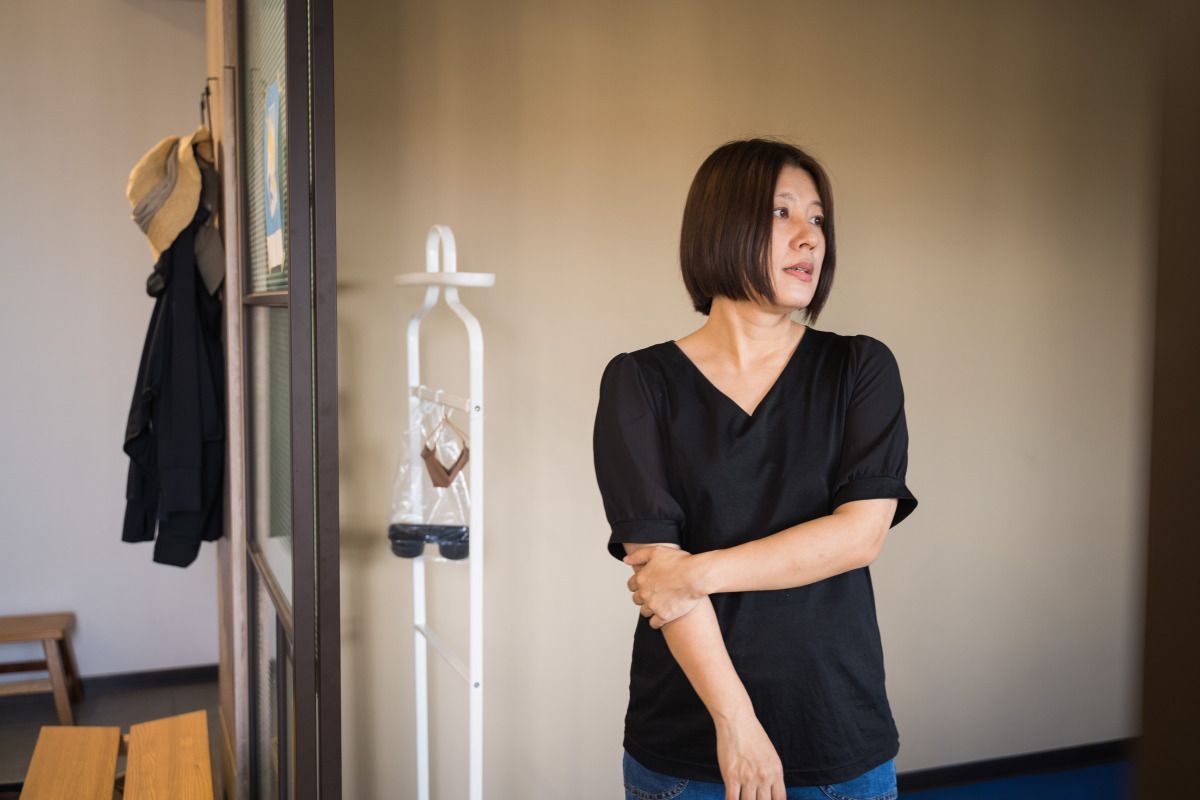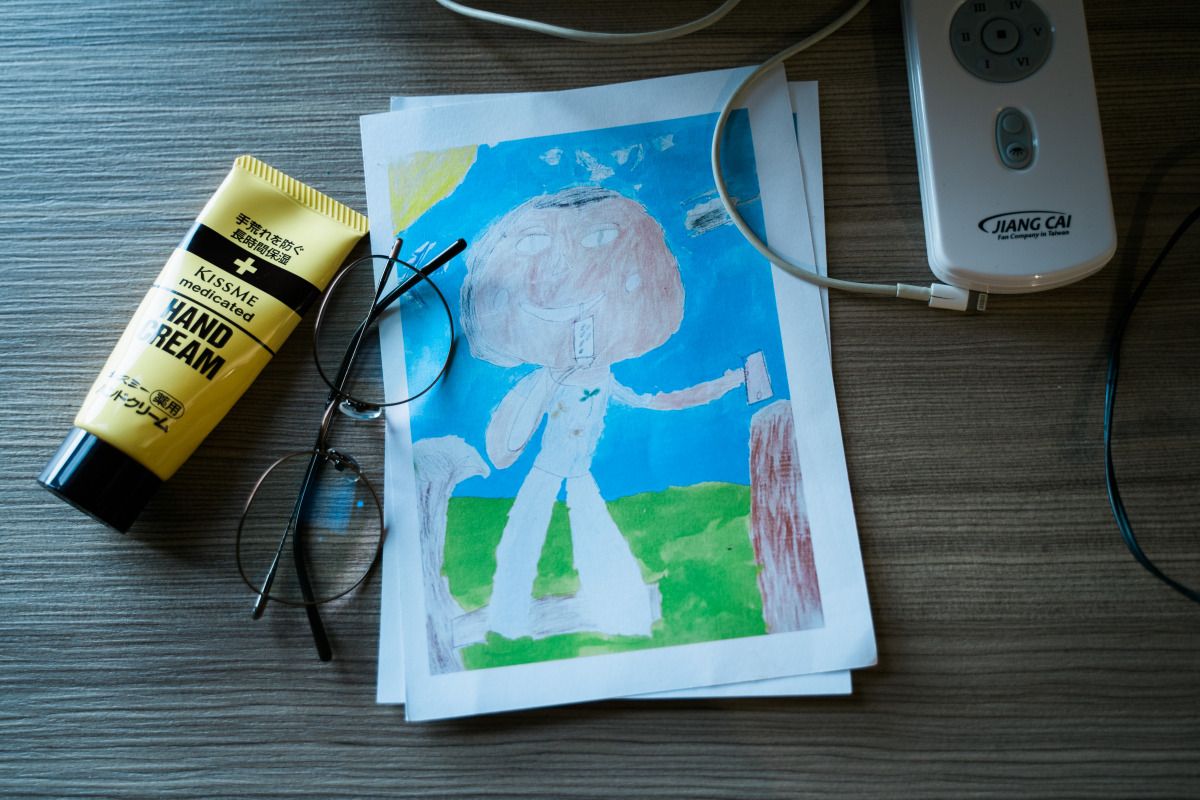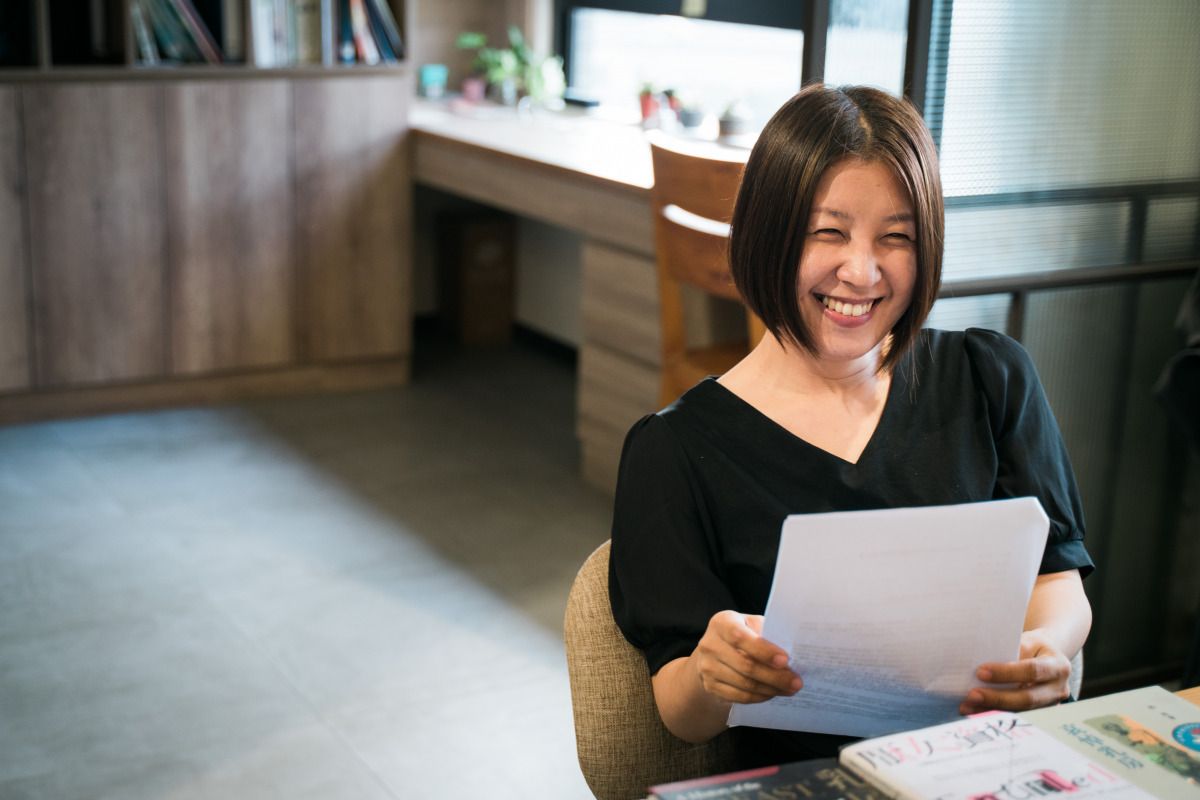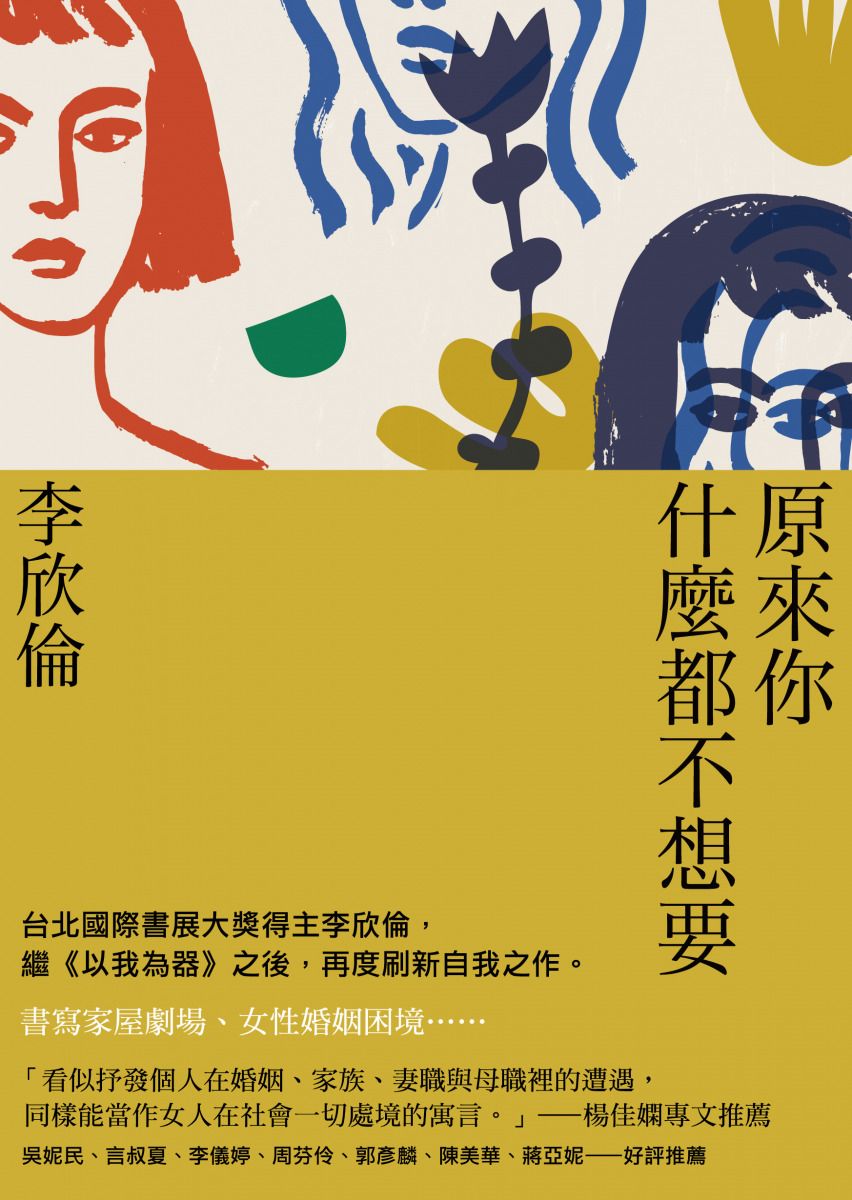People” How long does it take to admit that we are hurt in our marriage? Exclusive interview with Li Xinlun "It turns out you don't want anything"

Text| Hao Nier (writer)·Photography| Tang Zuoxin
➤Jump down, or write down
To describe Li Xinlun's works, one might start like this: Literature is her Guanyin, and her daily conversations with Guanyin often contain literature.
It can be seen in many places in the book that if life encounters pain, the description of Guanyin's low eyebrows will always show compassion and accompany her in pain. As a Buddhist believer, Li Xinlun has developed the habit of whispering the five words "Avalokitesvara Bodhisattva" before going to bed to fall asleep slowly. A few years ago, she fell into postpartum depression, tossed and turned, and finally found peace by reciting Guanyin, which was like driftwood and the meaning of writing to her.
"I didn't know if many things could be written down at the beginning, but...if I didn't put some experiences into words, they would just be there in a pile, and I would think about them day and night. Only after writing them down can I sort out the context and know that I am carrying a heavy load. , what weight are you carrying?"
Until the book was published, Li Xinlun still hesitated because compared to her previous works, this time she described more about marriage, and about women who were driven almost crazy by marriage. Based on plural conditions. In other words, her pen no longer focuses on herself, but explores her husband and his family. Some passages are poignant and straightforward - for example, in her childhood memory, the woman "Jing" who often haunts her hometown's traditional Chinese medicine shop writes: Her gambling husband and huge debts made her surrounded by hatred, like a madman, with "a tattoo on her eyebrow: I hate"; Li Xinlun even finally mentioned her marriage and conversations with her husband, those Discussion on the conflict between love and money.
——Are you worried about violating the ethics of writing by speaking so straightforwardly?
But if she didn't write it, she was afraid of becoming the crazy woman in her memory, grabbing people everywhere and saying how much she hated them. What is even more scary is: "I will either write down or jump down." Li Xinlun said in a calm tone, but repeated it many times.

➤If you can be happy, why live a metaphor
Li Xinlun teaches at a university and often serves as a judge for literary awards. Li Xinlun reads a large number of manuscripts and works. Among the descriptions of married women, there is an image that can often be seen, that is, the hard-working wife who supports her gambling husband - their common characteristics, Occasionally hysterical, occasionally talking to himself, and often passing by in a few words. Just like "Jing" in Li Xinlun's works, he obviously hates it to the highest point, but it only floats in people's thin memories.
It was obviously such a rare existence, but suddenly one day, the faces of those women suddenly became clear in Li Xinlun's mind, and she realized with horror that she seemed to be on the same track as those women in the past?
According to the book, her husband invested money in futures trading, which kept her awake at night. As a wife, is true love shown by acquiescence and support time and time again, or by stopping at the right time?
"I thought about the people who seemed to be mentally disturbed who appeared near our house in the past. Some of them became the talk of the neighborhood. I don't know why, but they seemed to be mostly women?" Li Xinlun recalled, and then thought of her role in "The Attic" "Mad Women" reads, "The female mental illness written in it has a kind of charm and is like a prophet. They are rebellion or resistance to the order of real life. It seems that female madness itself has such a metaphor."
But if you can be happy, why bother becoming a prophet?
Marriage does not need metaphors, but peace. "So You Want Nothing" is Li Xinlun's practice of pursuing peace. Writing is her balance beam. As long as she can still write, her life will not be too tilted. Although she also admitted: "I was shaking when typing some passages. The writing process was a bit painful, especially the first chapter, where I dealt with the female face that appeared in the Chinese medicine shop and my own marriage. It was also written down Only then did I realize that that incident had a huge impact on me, otherwise I should be able to write it down calmly after such a long time.”
Writing is a way of healing for some creators, but Li Xinlun's creation does not seem to be healing, but more like a genuine way of opening one's eyes to see the wounds clearly. She had to wait until things changed before she had the strength to admit, with a long sigh, that the damage she had suffered in her marriage at that time was far greater than she imagined.

➤The boundaries of creation: ethics of writing and true inquiry
The seemingly poignant revelation was not Li Xinlun’s original intention.
"In the book, it is written that my husband bought futures, and he made it public first. He ran some social media, and later turned the matter into a kind of story, and publicly acknowledged the tension that those actions caused to the family. I also told him I have said that the impact of this incident on me will be dealt with in my future writing," she said.
The essayist's works usually give readers a sense of voyeurism, but don't forget that peeping is just opening a crack. Talking about the full picture of the matter can often only be reduced to a few low-key hints, such as this sentence in the book: "I forced him to transfer all the remaining money back first, but when I talked about the previous , Alas, I can’t say anything anymore. After that, alas, it’s hard to say anything. (Is there a time when Jing is speechless?)” (Page 36)
The so-called "can't speak" and "hard to speak", translated means: "can't speak".
Isn't it possible that a writer's ethical boundary wanders between what is sayable and what is not?
"That's what prose is, you can't write it from a relatively far distance. Even if you can use pronouns like 'he' or 'you', it doesn't look like you're standing so close, but I feel like it's like in Yang Jiaxian's recommendation preface As I said, this book "does not turn away the camera when approaching, nor uses metaphor or montage to weaken the cruelty of daily life." This is probably because I chose the genre of prose."
Yes, creators actually have a choice.
Li Xinlun talked about how the first draft he gave to his editor was just a conversation between a couple. After the editor read it, he asked: "Is this a novel?" Li Xinlun thought to himself, "It would be great if it was a novel. More real details can be put in, and more cruelty can be tolerated. No matter what the reader sees in the end , the creator can also excuse it by saying that it is "purely fictitious".
Even though she knew there was this option, she ended up organizing the book into a book of prose. Ask why? She said that if she wrote it into a novel, she would be unable to cope with it. She would have to face the pain of reality and express it in prose.
"Actually, prose writing has been more difficult in recent years. One of the reasons is that we will directly put it together with "non-fiction literature." However, if our requirements for non-fiction writing are only "reportage literature", then When I write about an issue like this, do I have to ask my husband to call it balanced reporting? "Li Xinlun explained: "In recent years, the concept of non-fiction writing has emerged, and many people think that prose is non-fiction, so All the frameworks of nonfiction can be used to examine prose, and the easiest question to examine is: "What if this is true?" However, the definition of "truth" - in terms of prose - is completely unsolved.
In other words, Li Xinlun's imagination for prose is not a true pursuit, but a sincere inquiry. She really wants to know whether her years as a daughter, wife, and mother have also grown a head on her shoulders; She wanted to know what the lives of those women who had been transformed into supporting characters in literary rhetoric had experienced in their lives?
➤The taste of ice cream is a metaphor for women’s life
For many years, Li Xinlun has been nourished by the texts of many female writers to nourish her female consciousness. However, the thoughts that exist in the subconscious and have been internalized into some kind of discipline are still difficult to eradicate. For example, she wrote in the book that when she learned that her first child was a daughter, the first thing that struck her heart was not joy, but the past experience of her family favoring sons over daughters.
A few days before the interview, we sent the interview outline. Unexpectedly, what bothered Li Xinlun the most was: "Ask me what makes me happy as a girl? I have really thought about this question for a long time... I feel that girls work so hard and there are no happy moments."
She wants to go anyway, there are restrictions on women, and as for the good things - ah, yes, it is this: "I went to see my sister a while ago, we have a good relationship, she was so hard, I invited her to eat ice cream, two balls It was more than 200 yuan, very expensive, and the balls were super small! She originally said that we couldn’t eat together because of the epidemic, but I forced her to share some with me.” When talking about this, she laughed all the time: “I ate it. I feel so happy right now." She said, her eyes sparkling even as she recalled these moments.

She said that her father was a Chinese medicine practitioner and had been taught since childhood that the uterus was afraid of cold and women should stay away from ice cream and other foods. She warned herself like this, so every time she ate ice cream or drank a cold drink, it was like a stolen happiness that she had to savor in small sips, thus doubling her happiness.
"When I saw your question, I only wanted to get this example. It seems a bit miserable." Li Xinlun said, then smiled brightly and fell into the ice again. Although he did not do it deliberately, it can be proved by this - Li Xinlun is like his writing, there are few metaphors in life, but mostly examples, and every real example is like a literary metaphor, a metaphor for women's life experience .
However, if possible, she might prefer to see each woman's face more clearly after rhetoric. Not "crazy woman" or "hard-working wife", "holy mother", "forbearing daughter"...not such condensed golden sentences, but thousands of words of daily life, sonorous and powerful, not afraid of triviality.
"If you ask me what it means to me to finish writing this book, I would probably say, whether it is following the first chapter and mentioning women like Jing in it, or the motherhood mentioned in the second chapter... After I finished writing, I seemed to be able to say to those women: "So this is how I feel. Maybe many people have misunderstood you. It turns out these are the reasons why you can't leave."
Echoing the title of the book, perhaps after reading the book, readers will have a sudden explanation about the appearance of women: "It turns out that you don't want anything." ● (Original article published in OPENBOOK Reading Magazine on 2022-06-20 published)

It turns out you don’t want anything
Author: Li Xinlun Published by: Trojan Culture
About the author Li Xinlun <br class="smart">teaches at the Department of Chinese Literature, Central University. Published prose collections such as "Medicine Jar", "This Body" and "Using Me as a Tool". "Use Me as a Tool" won the non-fiction award at the 2018 International Book Fair and was also selected as one of the 20 essay collections in "The Rising Constellation of the 21st Century: Selection of Works by Taiwanese Writers After 1970" by Wenxun.
Like my work? Don't forget to support and clap, let me know that you are with me on the road of creation. Keep this enthusiasm together!







- Author
- More